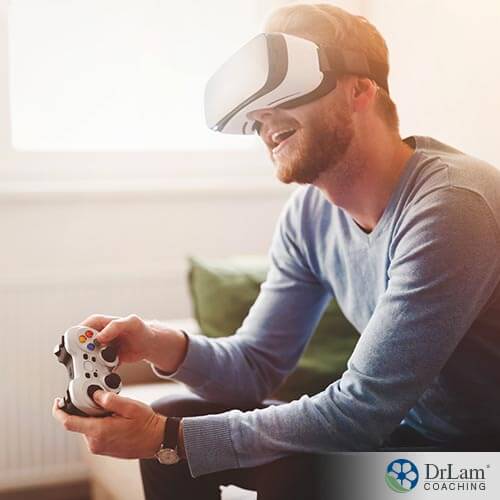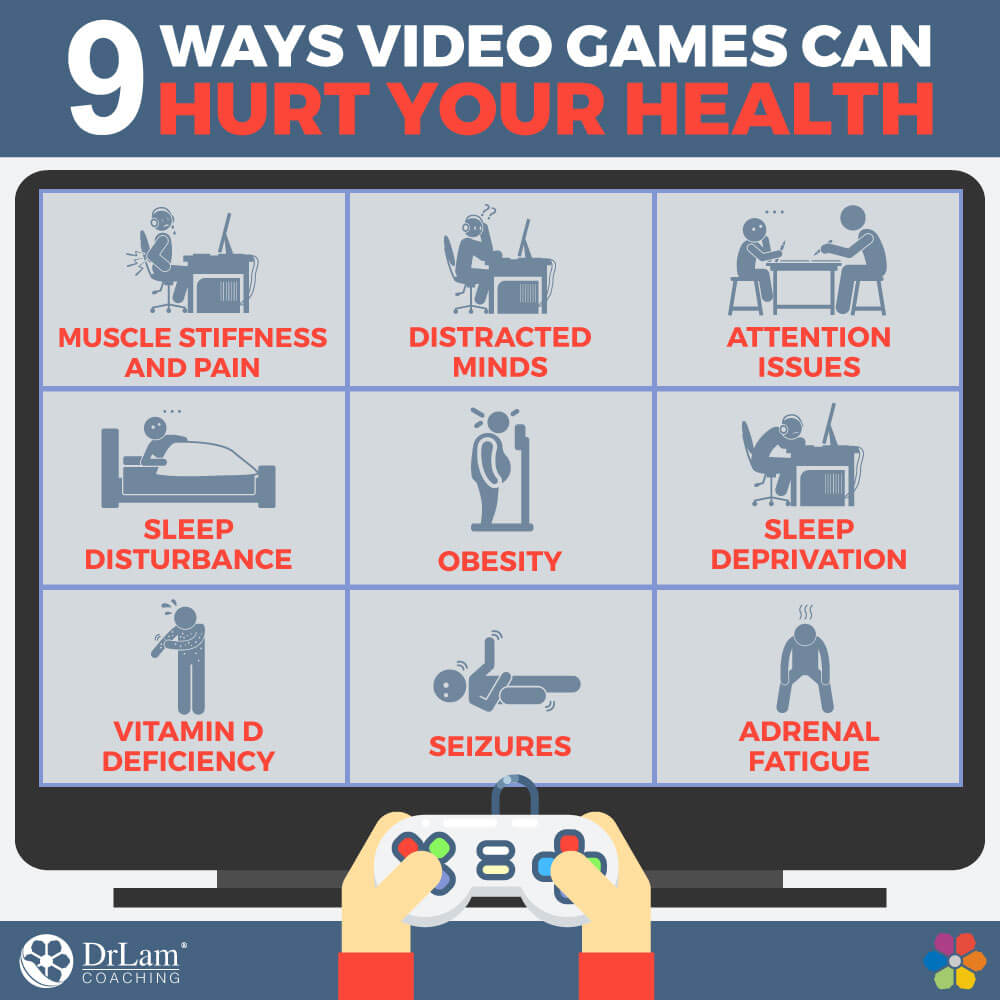 Video games are a very popular recreational activity, especially among youngsters. They provide an exposure to various cultures and domains, help make friends, and enhance problem-solving skills, analytical ability, and decision-making skills, thus increasing overall confidence. With loads of interesting onscreen games available, video gaming can be irresistible and often turns into an addiction even before you realize. Research has linked extreme gaming to various health issues. Managing your exposure to onscreen games is important to make the gaming experience enjoyable and beneficial without harming your health.
Video games are a very popular recreational activity, especially among youngsters. They provide an exposure to various cultures and domains, help make friends, and enhance problem-solving skills, analytical ability, and decision-making skills, thus increasing overall confidence. With loads of interesting onscreen games available, video gaming can be irresistible and often turns into an addiction even before you realize. Research has linked extreme gaming to various health issues. Managing your exposure to onscreen games is important to make the gaming experience enjoyable and beneficial without harming your health.
There are numerous video games on diversified domains ranging from sports, educational, puzzle, adventure, role-playing, action and real-time strategy to simulation and massive multiplayer online. Gamers can select the games based on their field of interest. With such a vast range of virtual games in existence, the gamers get a chance to explore diverse fields which can help enhance their skill levels.
For instance, airplane simulators can serve as first-hand training for aspiring pilots. Similarly, puzzles and role-playing virtual games can help in sharpening analytical and decision-making skills, whereas educational games can help in attaining higher academic scores. Onscreen games can be beneficial provided the time spent on them is less than an hour per day. Though there are positive effects of virtual gaming, spending hours in front of the screen can do more harm than good and has been scientifically linked to several health issues.
Video gamers often tend to have an eagerness of scoring more points and reaching advanced levels. This constant urge of attaining high scores can exert stress on the gamers. Furthermore, failure in attaining higher levels can cause anxiety, triggering your body’s stress response.
Spending long hours in front of the screen can cause bad posture, strain your eyes, muscles, and fingers, and increase electromagnetic field (EMF) exposure which can cause stress to your body.
Consistent stress can trigger your adrenal glands to secrete more cortisol. Further, onscreen games can also cause various health issues thus exerting additional stress on your adrenals, making them dysfunctional and leaving you fatigued. If you often experience extreme fatigue with symptoms of low energy levels, difficulty in waking up, anxiety, brain fog, stubborn weight gain, constipation, low concentration level, insomnia, and craving for salty and fatty foods, then it could be indicative of Adrenal Fatigue Syndrome (AFS).
Extreme video gaming can trigger stress hormones in your body. The NeuroEndoMetabolic (NEM) Stress Response System is your body’s natural defensive shield against stress. It is a very delicate network of various organs and six circuits that work in close unison to fight stress. There is a pair of walnut-shaped adrenal glands, each present on the top of your kidneys, that secrete cortisol and are a part of the stress response system.
When your body experiences stressful situations, the NEM signals your adrenals to produce the anti-stress hormones cortisol. However, consistent stress can overburden your adrenals, reducing cortisol secretion and affecting your body’s natural stress-fighting ability. Adrenal dysfunction and cortisol imbalance in your body can lead to AFS.
Minimizing stressors such as video games is a vital part of adrenal fatigue recovery as it enables your adrenals to heal naturally. Even exercise onscreen games can tax your adrenals with the electromagnetic field generated by monitors and television. Those with EMF sensitivity need to take care of their exposure to video gaming.

Despite the various advantages of onscreen games, extreme gaming can outweigh its benefits by causing various health issues. Here is how spending a lot of time sitting in front of the monitor playing games can be bad for your health:
The first sign of too many video games is muscle stiffness and pain. Spending long hours playing games can strain the muscles of your fingers, wrists, elbows, and shoulders causing pain. Poor posture and sitting in the same position for a long period can cause increased stiffness in the neck, shoulders, arms, and lower back.
Recently, certain video gaming companies have introduced active gaming systems which require the gamers to physically walk in the right direction to unlock new levels. The gaming companies claim that gamers benefit from physical activity with walk-through instructions and help couch potatoes be active. However, in reality, exercising with full consciousness is pertinent to attaining fitness. Moreover, the active gaming systems have their own share of side effects. They can lead to distractions and low concentration levels. Several accidents have been reported where the gamers walked through the traffic or drove unmindfully while still engaged with the games.
 Studies have found that children who spend more time playing screen games or watching television may have attention problems. Researchers found that children who spent more than two hours engaged in onscreen activity such as video gaming had more trouble paying attention in school.
Studies have found that children who spend more time playing screen games or watching television may have attention problems. Researchers found that children who spent more than two hours engaged in onscreen activity such as video gaming had more trouble paying attention in school.
Avid gamers can find it hard to switch off their gaming device. Research reveals that playing video games for more than an hour at night causes delay in falling asleep and a drop in REM which significantly affects overall sleep quality. Furthermore, playing exciting video games before sleep has been linked to reduced production of the sleep hormone melatonin.
Estimates reveal that over one-third of Americans are obese for which sedentary lifestyle and poor diet are mainly to be blamed. A report in the Journal of Adolescence has directly linked inadequate physical activity and childhood obesity to video games. Children in the age group of one to twelve years were examined to find the link between childhood obesity, video games, and television. The results revealed that children spending a considerable time on video gaming weighed more than those who played very little onscreen games.
According to an article published in the Journal of Neurology, Neuropsychology, and Psychiatry, up to 29 percent of epilepsy patients are reported to have experienced video-game-induced seizures. Stress, hyperventilation, and fatigue during video gaming can trigger seizures in children with epilepsy.
According to reports in Pediatrics International, it is vital to limit video gaming to less than an hour per day. However, there are hardcore gamers who spend more time playing at the cost of losing sleep. The rate of sleep deprivation from video gaming is reported to be high among young people. Inadequate sleep can disturb all your biological cycles leading to a host of unpleasant symptoms such as constipation, headache, nausea, low concentration, distraction, anxiety, and depression, which can further lead to adrenal fatigue.
Unlike other vitamins which can be sourced from foods, vitamin D is produced by your body when exposed to sunlight. There are certain foods such as mackerel, salmon, eggs, raw milk, and tuna that contain vitamin D. However, it is important to have sunlight exposure to meet your body’s recommended vitamin D need. This fat-soluble vitamin plays a major role in absorption of calcium into bones. Staying indoors playing video games can deprive your body of natural sunlight making you vitamin D deficient. Lack of vitamin D has been linked to cancer, dementia, seasonal depression, weak immune system, weak bones, autoimmune disorders, and skin issues.
 The above health issues resulting from video gaming can cause additional stress on your body. Continuous stress can overburden your adrenals causing adrenal dysfunction and cortisol imbalance which can increase the risk of developing adrenal fatigue.
The above health issues resulting from video gaming can cause additional stress on your body. Continuous stress can overburden your adrenals causing adrenal dysfunction and cortisol imbalance which can increase the risk of developing adrenal fatigue.
With numerous video games on various domains in the existing market, gamers gain an exposure to diversified virtual platforms. Gaming can be beneficial as it boosts the confidence of gamers by helping them to enhance decision-making, analytical, management, and puzzle-solving skills. However, extreme gaming can do more harm than good. Research has linked increased onscreen gaming activity with various health issues including muscle stiffness and pain, distraction, attention issues, seizures, sleep deprivation, aggressive conduct, vitamin D deficiency, and adrenal fatigue syndrome. Moderating exposure to onscreen games can be an effective solution to making your gaming experience healthy, enjoyable, and beneficial.
© Copyright 2018 Michael Lam, M.D. All Rights Reserved.
Avid gamers can find it hard switching off their gaming device. Research reveals that playing video games for more than an hour during the night causes delays in falling asleep and a drop in REM which significantly affects overall sleep quality. Furthermore, playing exciting video games before sleep has been linked to reduced production of the sleep hormone melatonin.

